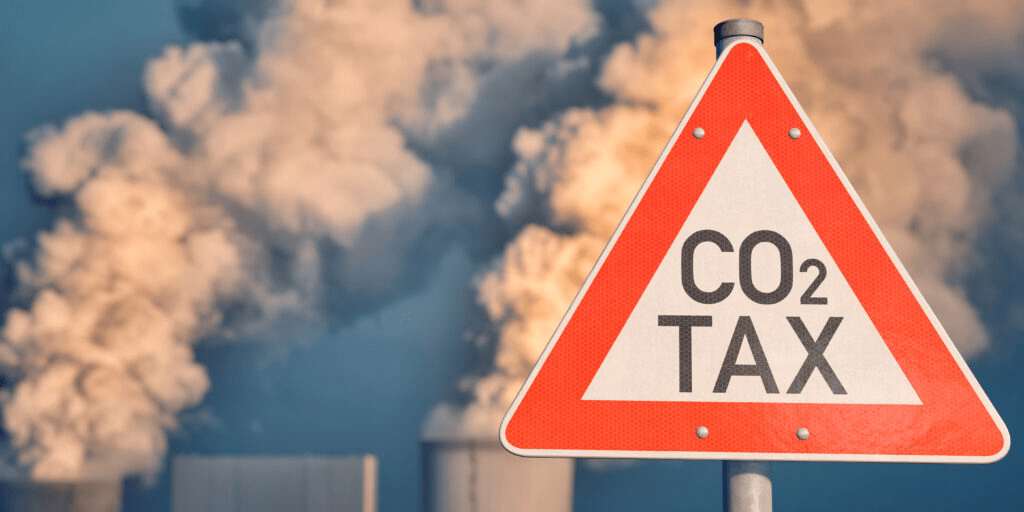In Short : The EU and UK’s imposition of a “carbon tax” has implications for the Indian industry. It signifies a push for sustainable practices, potentially affecting Indian exports to these regions. Indian industries may face increased costs, necessitating investments in cleaner technologies, emission reduction measures, and adherence to environmental standards for continued market access. The carbon tax emphasizes the global shift towards green initiatives, prompting Indian businesses to adopt environmentally friendly practices to remain competitive internationally.
In Detail : After European Union, now UK decides to implement its Carbon Border Adjustment Mechanism (CBAM) from 2027
After the European Union, the UK has also decided to implement a carbon import levy/tax—Carbon Border Adjustment Mechanism (CBAM)—on some products from 2027. The move aimed at protecting businesses against cheaper imports from countries “with less strict climate policies” may subject $775 million of Indian exports or 6.8% of the exports to the country to 14-24% tax, as per reports quoting experts.
According to reports, the UK will finalise the details, including the precise list of products to be covered, after consultations next week. However, the decision has re-ignited tensions and arguments related to “historic wrongs by developed nations in escalating the climate conditions to its current state”.
The move is expected to impact businesses in other countries, including India.
As per economic think-tank Global Trade Research Initiative, India’s exports worth $775 million to the UK may be impacted due to carbon tax on products like iron and steel, aluminium, fertiliser and cement.
India’s exports are already under stress
According to a GTRI report in 2023, India’s merchandise exports declined by 5.3%, primarily due to diminishing presence in labour-intensive sectors such as textiles and leather and a weak global trade growth.
The CBAM will pose a significant challenge for India’s metal industry, experts say.
The EU’s carbon tax is expected to affect Indian metal exports worth over $8 billion annually, starting 2026.
Earlier, responding to the EU’s plans, commerce and industry minister Piyush Goyal has already said that India will “retaliate” against such unfair taxes.
“Bharat will address the problem of CBAM with confidence. We will find solutions. We will see how we can convert CBAM to our advantage. Of course we will retaliate. India today does not do these things easily. Even with the US, we retaliated when they had put unfair taxes on us. And see what happened. We were able to resolve all the seven WTO disputes,” Goyal was quoted as saying.
CBAM and India
According to reports, the UK decision will apply to carbon-intensive products in the iron, steel, aluminium, fertiliser, hydrogen, ceramics, glass and cement sectors.
“This levy will make sure carbon intensive products from overseas – like steel and ceramics – face a comparable carbon price to those produced in the UK, so that our decarbonisation efforts translate into reductions in global emissions,” UK Finance Minister Jeremy Hunt was quoted as saying.
So far as India is concerned, sources say the government considers the tax “unfair” and is considering several measures, including taxing imports from these countries for their “historic wrongs”.
“Broadly the tax will be levied on import of products in manufacturing of which carbon emissions are emitted. However, the move will escalate the price of imported goods, making them less competitive. The fact is you cannot force the market to pay the price without any economic incentive for reducing emissions,” an industry representative said, seeking government policy support.
According to officials, India may be working on different measures like collecting and keeping the tax within the country and using it to decarbonise its own industry.
India may also be considering a tax on imports or goods coming from European countries. India is working on a carbon tax mechanism that aims to penalise imports from developed countries for their historic carbon emission that actually contributed to fuelling global warming at the cost of developing nations, they add.
CBAM criticism
Critics argue that if helping the environment and cooling down the globe is the ultimate goal, critics say fossil fuels contribute to 90% greenhouse and 75% of carbon emissions and these nations should actually tax fossil-fuel imports.
If the aim is to counter carbon leakage (companies moving production to countries with lesser environmental regulations to avoid paying carbon prices), that can be achieved by taxing imports from companies doing that instead of taxing all world imports, they add.

